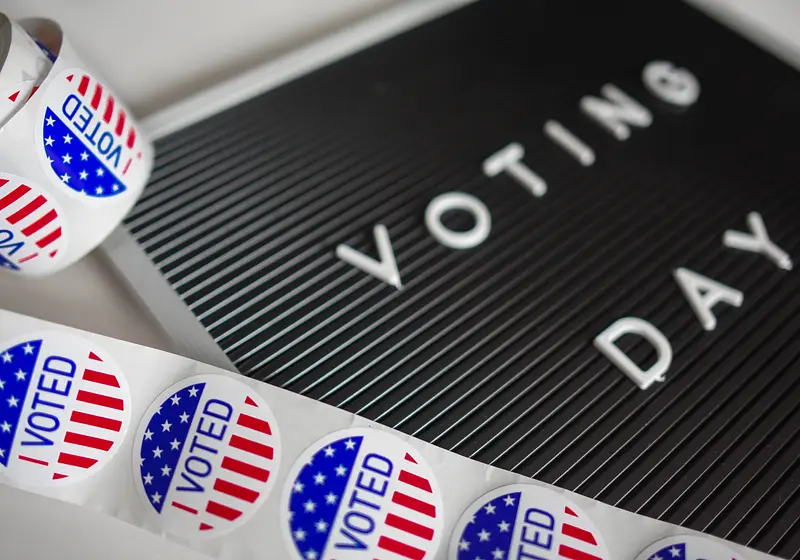With the 2024 election looming a bit over a year away, the Republican Party is facing the decision of which presidential candidate to nominate to the national stage. President Biden's decision to run again places him as the opponent for the Republicans. Though there are a number of experienced (and not-so-experienced) candidates vying for the battle with Biden, it is a trivial decision for many Americans.
Donald Trump has been an assertive presence for the past several years, both in and out of his presidency. His name dominates headlines and carries great power, and it has even evolved into a political ideology: Trumpism. Trump's influence in America cannot be understated, especially among the "common people" targeted by his populist policies.
His charismatic and unusually intense personality, completely breaking free from traditional conservatism, has made him a popular figure for many Republicans -- in fact, for most Republicans. Polls show that as of September 1, 2023, Trump is the top choice for 50% of Republicans, far ahead of the next most popular candidate with 15%.
So, with Trump so far ahead, is he going to be the face of the Republican Party in 2024? The answer is not simple. The first GOP debate of the election cycle -- which, notably, Trump did not attend -- served as a platform for eight of his opponents, bringing their personalities and policies into the limelight. Before analyzing Trump's chances against them, let's examine the backgrounds of his top competitors.
Let us slide into your dms 🥰
Get notified of top trending articles like this one every week! (we won't spam you)The Debate Brought Out the Alternatives
There are really three candidates who may be able to stand a chance against Trump, based on their campaigns and the debate. Currently, second place in the polls is Ron DeSantis, governor of Florida. His campaign is perhaps the most interesting to follow, considering he was only 2-3 percentage points below Trump in mid-February of 2023.
After that, however, there has been a consistent decline in approval. Notably, his ratings in February were much higher than his ratings in May, when he formally announced his campaign bid. This is for a number of reasons. DeSantis has faced several setbacks in his campaign, from technical issues on Twitter to trouble with funding the campaign itself. His strong stances on issues like abortion, education, and immigration did not quite show up in the debate. Insead, DeSantis was somewhat of a wallflower and did not receive the heat that was expected. This was part of his strategy, claims his campaign manager James Uthmeier, who stated that “while other candidates attacked each other, Gov. DeSantis stayed focused on the American people and fighting for their future with a clear vision to fix our economy, secure the border, empower parents, back law enforcement and stand up to the leftist elite and the D.C. establishment.” However, many criticize the lack of pressure on DeSantis during the debate as indicative that he is no longer the major threat to the other candidates.
Instead, that position goes to Vivek Ramaswamy, a 38-year-old entrepreneur from Ohio. In the beginning of the year, few voters knew him or his policies. For the months following his somewhat different bid for candidacy in February, he remained unknown, struggling to pick up more than 1 or 2 percentage points in the national polls. Yet his anti-woke campaign (a lot of it based on misinformation) picked up steam quickly, propelling him to about 10 percentage points in the polls. His unabashedly Trumpist ideals seem to be popular with many. He is seen as a younger, more energetic version of Trump with his same policies, but without his legal issues and controversies. Moreover, his personality is different, as he comes across as charismatic and easygoing, quite the opposite of Trump. All of this is alarming for the other GOP candidates. He received the most degradation during the debate -- and along with that, the most attention. He was attacked mainly for his lack of political experience, but also for some radical statements, such as saying that "I am the only person on the stage who wasn't bought and paid for, so I can say this: the climate change agenda is a hoax".
The third and final person on the GOP debate stage who could win the nomination is former vice president Mike Pence. Based on polls, he was the clear third choice for most of 2023, but was overtaken by Ramaswamy in late July. His decline in popularity led many to believe that he was out of the race, but Pence came out as a surprising winner in the debate for some people. He had plenty of attention, got some quips at Ramaswamy, and used the stage to talk about some of his policies, like abortion. He also discussed the events of January 6th and how he upheld the Constitution. His experience is one of his biggest assets, having served as a congressman, a governor, and a vice president.
Take the Quiz: Which Indian city is the perfect holiday spot for you!?
Let's match you with an Indian city that you would love!
What's Holding Trump Back?
Even if Trump is far ahead of DeSantis, Ramaswamy, and Pence, he has some shortcomings.
One argument against Trump is his electability, or lack thereof. While he may be an ideal president, he still has to make it there. That means beating Biden in the national election -- something he tried to do in 2020, and failed by a considerable margin.
He claims, of course, that he did not really lose the election, and it was rigged. There is no semblance of evidence for this, as has been shown numerous times. It is true that many of his supporters agree with him despite there being no evidence behind the claim, there is also undoubtedly a population of America that has shifted their support away from him because of this lie. Furthermore, Trump has never won the popular vote either; his win in 2016 was through electoral votes, while Clinton picked up most of the popular vote. All of this paints a picture of a candidate who could well lose the national election to Biden -- again. The most electable candidate in the eyes of many Republicans is instead Ron DeSantis, currently.
But it is entirely possible that Donald Trump's electability problem will not hurt him. Biden is seen as an old, frail, weak candidate, one who will put up little opposition against whoever the nominee is. So another problem of Trump's is that he is struggling in Iowa and New Hampshire.
At first glance, these two states may seem unimportant -- until one sees that they are the first two states for the Republican primary. For the past 20 years, the winner of New Hampshire's presidential primary has gone on to win the party's nomination. Even though Trump is in the lead, his support is dwindling with around 40 percentage points in the polls. This is where an interesting phenomenon may take place: according to New Hampshire Governor Christopher Sununu, if enough candidates drop out during or after the Iowa primary, the voters for these candidates will move to someone other than Trump. After all, he does not have the majority. If only a couple of candidates remain in New Hampshire for the primary, the votes will not split enough for Trump to win.
The final shortcoming of Trump's campaign is the most prominent, dominating headlines: his legal issues. Trump is plagued by an array of charges which affect his campaign in many ways. On the one hand, this could actually increase some of his support, since many Americans believe the charges are politically motivated.
On the other hand, Trump is somewhat seen as a liability by voters, who will have to deal with all of these challenges in months and years to come. The truth is, any prediction of how this will affect his popularity is complete speculation, as nothing like this has ever happened before in history. So instead, let's focus on more practical issues as a result of these legal problems. The first is the schedule of his trial dates, and how that will clash with the schedule of Republican primaries in 2024. During the month of March, with nearly 30 state and territorial primaries, Trump will have two trials. The first is on March 4, the day before Super Tuesday, regarding his efforts to overturn the federal election on January 6. The second is on March 25, regarding his hush money payments. He also has a trial on January 15, the same day as the Iowa caucus; and a trial on May 20. The absurdity of the situation cannot be understated, and as there is no precedent for this, it is unclear how much of an effect these trials will have on his campaign. It is safe to say that they will not help.
The other setback from these legal issues is simple but effective: Donald Trump may not be able to run in 2024. Not as a direct result of the trials -- he could probably still run if convicted. What's stopping Trump from running is a small, neglected part of the 14th Amendment.
Section Three stipulates that "No person shall... hold any office, civil or military, under the United States, or under any State, who, having previously taken an oath... to support the Constitution of the United States, shall have engaged in insurrection or rebellion." The argument is that in inciting the riots on January 6 to overturn the election, Trump has very clearly engaged in insurrection. This therefore disqualifies him from presidency. A counterargument is that Section Three should be read very narrowly so as to uphold democracy. The decision would likely come down to the Supreme Court, and we will have to wait and see what happens. If Trump truly did commit an act of insurrection, this would be the most damning problem he faces in the upcoming 2024 election.
Who Can Be the Best Trump?
The specified obstacles in Trump's bid for presidency could turn many voters to someone else. So, who if not Trump?
I believe if this race was happening 30 or 40 years ago, Pence would have been the prime candidate. He represents a more traditional, conversative side of the Republican party; a side that dominated the party at the end of the 20th century. However, candidates like Trump, DeSantis, and Ramaswamy present a modern, conservative populism -- and it is no coincidence that they are winning.
That is the issue at hand. The Republican Party and its proponents are not the same Republican Party from Reagan's presidency. While Pence may well be the best "original" conservative out of all of the candidates, Republican voters are not looking for that kind of president anymore. As the Washington Post puts it: "Pence tried to make the case that he is the tried-and-true conservative in the race, but he seemed to be making a case to a Republican Party that doesn’t really exist anymore."
Trump's rise to presidency in 2016 brought with him a new Republican Party, and they want a president who appeals to ordinary people, fights back against the "woke left", and takes decisive foreign and domestic policy action. This president would be able to solve the nation's so-called identity crisis and showcase America's strength to the world.
That sounds a lot like Trump -- or at least, the version of him that won in 2016. Now, however, he has to deal with an abundance of drama that the GOP seems to be growing weary of defending. So, the question is really: who can be the best version of Trump; not with his personality, but with his policies?
The choice clearly comes down to Ramaswamy and DeSantis. DeSantis is currently in the lead in the polls, but Ramaswamy, referred to as Trump 2.0, truly embodies the energy of Trumpism. Both Ramaswamy and Trump entered the campaign as businessmen with no prior political experience. Ramaswamy's policies align with Trump's, perhaps even more radically in some cases. In his own words, he wants to take Trump's agenda "much further". He is a self-proclaimed supporter of Trump, labeling him the greatest president of the 21st century. During the first debate, Ramaswamy was unapologetically the first one to raise his hand when the candidates were asked whether they would support the former president if he was convicted. On top of all this, he is charismatic and extraordinarily adept at winning over people, a skill undoubtedly picked up from his career as a salesman.
This is not to say that DeSantis will certainly fall behind. The only thing to be certain of is that change is bound to happen in both Ramaswamy's and DeSantis' campaign strategies. I believe that if DeSantis does want to be a frontrunner in the election, he has to utilize Trumpist ideals to appeal to the modern Republican party.
This does not necessarily entail showing support for Trump, but rather advertising himself as a candidate who will bring direct, immense change to America; much like Trump did in 2016. It is still much too early to make a valuable prediction on who has a chance at beating Donald Trump in 2024, but they may find that to beat the former president, they will have to become him.









.jpeg)








